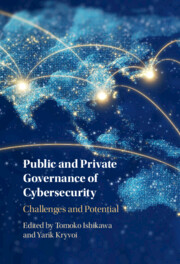Book contents
- Public and Private Governance of Cybersecurity
- Public and Private Governance of Cybersecurity
- Copyright page
- Contents
- Contributors
- Acknowledgements
- Abbreviations
- 1 Introduction
- 2 International Relations Perspectives
- 3 The State-Oriented Model of Internet Regulation
- 4 Cybercrime, the United Nations, Prospects, and Challenges for International Co-operation
- 5 Responding to Public and Private Cyberattacks
- 6 International Data Transfers and Cybersecurity
- 7 International Trade Law and Cybersecurity
- 8 Cyberthreats, Human Rights, and FDI Restrictions
- 9 Public–Private Partnerships on Cybersecurity and International Law
- 10 The Geopolitical Divide, Norm Conflict, and Public–Private Partnership in Cybersecurity Governance
- Index
2 - International Relations Perspectives
Cybergovernance in the Post-liberal Order
Published online by Cambridge University Press: 09 November 2023
- Public and Private Governance of Cybersecurity
- Public and Private Governance of Cybersecurity
- Copyright page
- Contents
- Contributors
- Acknowledgements
- Abbreviations
- 1 Introduction
- 2 International Relations Perspectives
- 3 The State-Oriented Model of Internet Regulation
- 4 Cybercrime, the United Nations, Prospects, and Challenges for International Co-operation
- 5 Responding to Public and Private Cyberattacks
- 6 International Data Transfers and Cybersecurity
- 7 International Trade Law and Cybersecurity
- 8 Cyberthreats, Human Rights, and FDI Restrictions
- 9 Public–Private Partnerships on Cybersecurity and International Law
- 10 The Geopolitical Divide, Norm Conflict, and Public–Private Partnership in Cybersecurity Governance
- Index
Summary
This chapter offers an analysis of the challenges for governments and the private sector in cybersecurity governance from a systemic perspective. It first identifies the challenges that the liberal international order, characterised by political liberalism, economic openness, and international cooperation, has faced in the area of cybersecurity governance. It also observes that there have so far been no successful global efforts to harmonise rules or create a unified regime. This chapter then emphasises how the private sector’s essential role as innovators possessing technological expertise is unique to cybergovernance and explains how the interplay of different actors, both public and private, has practical meaning for states and actors.
- Type
- Chapter
- Information
- Public and Private Governance of CybersecurityChallenges and Potential, pp. 12 - 39Publisher: Cambridge University PressPrint publication year: 2023

